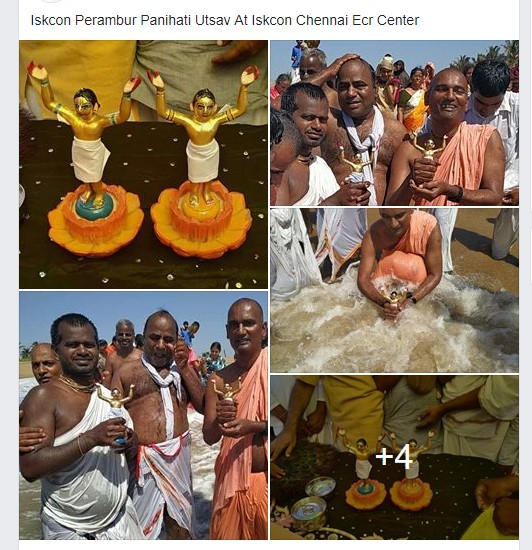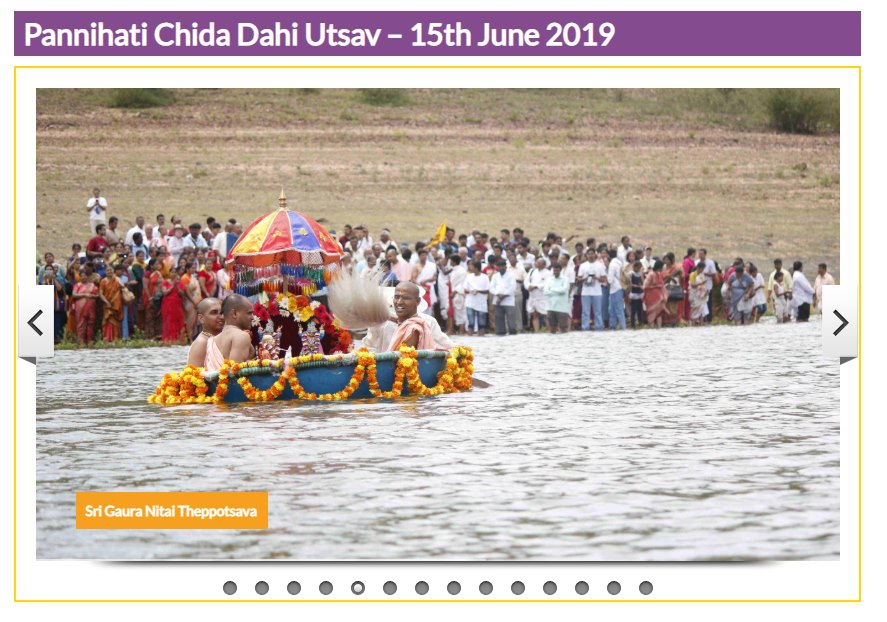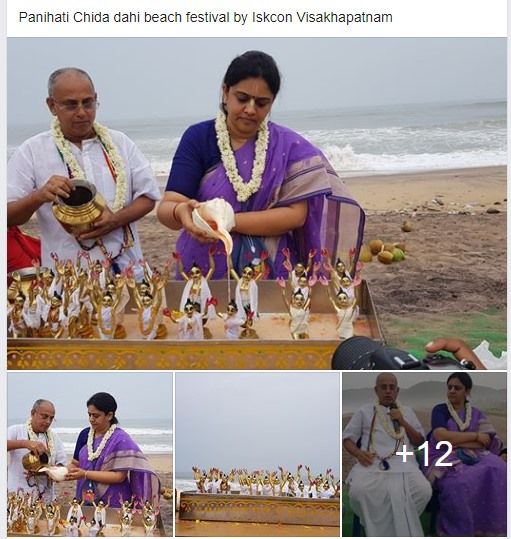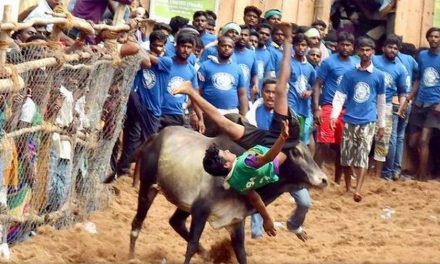At what point in time did the ISKCON Panihati festival become a picnic to a random nearby river? Should installed deities be whimsically taken out to random locations? The village of Panihati was located on the banks of the Ganges, but as far as I am aware there is no instruction that installed deities should be taken out to random picnic locations on this day, as is now the custom in ISKCON (at least throughout South India).
The philosophical basis seems to be from the following verse:
gopa-jāti āmi bahu gopa-gaṇa saṅge
āmi sukha pāi ei pulina-bhojana-raṅge
“I belong to a community of cowherd boys, and therefore I generally have many cowherd associates with Me. I am happy when we eat together in a picnic like this by the sandy bank of the river.” – Chaitanya Charitamrita, Antya Lila 6.75
But this is not an instruction to take installed deities out of temples, search out a river, and hold a picnic. The village of Panihati was located on the banks of the Ganga river. They happened to sit and eat on the banks of the river. Does that mean every temple in the world should locate a river to hold the festival? If Chaitanya Mahaprabhu mentions that he likes to go to Vrindavan, do we then start carrying all installed deities to Vrindavan and make a festival out of it?
The actions and statements of an avatar can not be whimsically used to establish how temple deity worship is supposed to be conducted. Just because Nityananda Prabhu mentions as a cowherd boy he liked to eat on the banks of a river does not mean installed deities should now be taken out to rivers for festivals.
What makes it worse is that a number of devotees have died in these whimsical programs over the years by drowning. People who don’t know how to swim are brought out to these river programs (with no life guard or supervision) and occasionally devotees have been swept out in the river current and died.
We find in ISKCON one person makes a change, and then everyone jumps on and copies it eventually making it a standard. Its a similar case with the Pushpa Abhisheka being conducted in ISKCON instead of Pushya Abhisheka. Now it has become an official program in the ISKCON calendar of showering flowers on the deities, all started from one person’s mistake.
Someone may ask what is wrong with showering flowers on the deities on Pushya Abhisheka.
On its own it is wonderful (except the part of throwing the prasadam flowers around on each other like a circus afterwards, which I believe is getting stopped now), but when it is presented in connection with Pushya Abhisheka it perpetuates the misunderstanding that that is the meaning of Pushya Abhisheka and is how traditionally Pushya Abhisheka is supposed to be celebrated. It has now become such that if you aren’t showering flowers during Pushya Abhisheka people will question why you aren’t doing it properly. Pushya is a nakshatra, and the abhisheka (with ghee) done on the purnima aligned with that nakshatra is called as Pushya Abhisheka. It has nothing to do with showering flowers on the deities, which is a misunderstanding, thinking that pushya is connected with pushpa. I find it uncomfortable to institutionalize a mistake, no matter how wonderful the mistake may be on its own.
In a crazy scenario, what if someone thought that pushya purnima, was pizza purnima, and then they started offering pizza to Lord Krishna on pushya purnima. Afterwards, all the temples liked it (because who doesn’t like pizza), and the next thing you know, every temple is offering pizza on pushya purnima. Finally someone comes along and says “we shouldn’t be offering pizza on pushya purnima”. The people’s response may be, “what’s wrong with pizza?” The point is nothing is wrong with pizza. Everyone likes pizza. But to imply that pushya purnima is connected to pizza is a mistake, and no mistake should be standardized regardless of how wonderful it may seem. This may seem like a crazy story, but if we replace pizza with pushpa, the story actually happened and is now institutionalized in ISKCON as a standard.
Here is one ISKCON website, describing what Pushay Abhisheka is: “Pushya Abhisheka is a festival where the Lord is bathed in soft and cooling petals of fragrant flowers.” That is completely false, but this is what is being spread in ISKCON as the meaning of Pushya Abhisheka, all because one ISKCON guru misunderstood it to refer to Pushpa (and gurus are never wrong).
So in both of these cases, Panihati and Pushya Abhisheka, we find that someone made an incorrect change, and everyone copied it because they thought it was an improvement on the tradition. These are very dangerous precedents. Where is the good council in ISKCON? Why is it that no leader or GBC ever speaks out about any type of mistake or misunderstanding to correct it? Aren’t they supposed to be the wise devotees guiding the society? Everyone is scared to open their mouth and rock the boat. They just want to get along for the sake of ease of existence, at the expense of proper philosophical counsel and guidance for ISKCON.
Who came up with the idea that after performing abhisheka of a deity you take the ingredients and start throwing them around on everyone like a game, and have all the devotees trample the prasadam with their feet? How did this not instantly come across as wrong? If not a single GBC could see that this was not the right way to deal with prasadam, then there is a serious problem in the GBC.
You can see a video of a Chowpatty Pushpa Abhisheka here, and the audience is full of ISKCON leaders, sannyasis and gurus, and all of them are enjoying offending the prasadam of Lord Krishna. How is it possible none of them had the sense to know this is wrong?
Seeing that no one is speaking up, if any of us common devotees are so foolish as to open our mouths, we will immediately be labelled as envious, offensive, useless people who do nothing and have no right to speak or be concerned with such matters. Not all opinions are given out of envy with an intention to offend. Some of us are just concerned by things we see and the lack of guidance being provided by the GBC to temple leaders.















